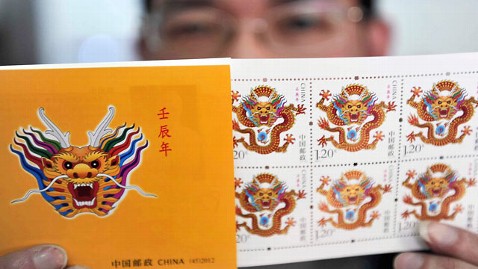
On Jan. 5 every year in China, a commemorative stamp of the corresponding year's Chinese Zodiac character is released to celebrate the coming lunar New Year. It is an event not unlike the unveiling of new pair of Air Jordans.
"People started lining up outside the post office around 4 a.m.," Ms. Feng, a post office worker in Beijing told ABC News. "We kind of felt sorry for them, having to stand out in such bitter cold."
It was a scene duplicated all over China and this year's stamp — honoring the dragon — sold out soon after the post office doors opened.
Shortly after that, the controversy began.
"When I saw this year's dragon stamp, I was scared to death!" wrote author Zhang Yihe on her Sina Weibo, China's Twitter-like service.
The dragon is depicted with its fangs bearing and claws out, seemingly ready to pounce. Its eyes are a dark abyss with only the littlest beads of white staring out at the viewer.
Chinese have a natural affinity towards dragons. The Chinese, the legend goes, are thought to be the descendants of the dragon.
While the Chinese view the dragon as an auspicious and graceful creature, the West has historically depicted dragons as threatening beasts.
The stamp's designer Chen Shaohua said the fierce dragon he drew is supposed to represent a confident China.
Some critics fear the depiction may be sending the wrong message: aggression instead of confidence.
Over the past year China's neighbors like Vietnam and the Philippines along with the United States have bristled at China's more aggressive/confident strut on the geopolitical stage , especially in its pursuit of increasing its naval power and the ongoing territorial disputes in the South China Sea.
Speaking to Hong Kong's South China Morning Post, Chen conceded that he had not "thought about foreigners' perceptions of a ferocious dragon and whether it represents a rising China," but offered that his fierce looking dragon would help block the "evil spirits of 2012."
This is only the third time a dragon stamp has been released to commemorate the Lunar New Year since 1949. Both in 1988 and 2000, the dragons were depicted in more graceful and gentler poses.
Chen, on his Weibo account, wrote that China Post officials had asked him to adjust his design to make the dragon "gentler and more modern." Chen, who based his design on the dragon that used to adorn the front of the Chinese emperor's robes, stood his ground. The post office officials ultimately relented and accepted his justifications.
The growing controversy appears to be a boon for stamp collectors, especially those who got to the post office early to buy a set. The Associated Press reports that one stamp reseller was reportedly selling a set of 20 for 178 yuan ($28) — much higher than the original face value of 24 yuan ($4).
Dragon stamps have proved to be especially valuable on the collector's market. The 1988 version of the dragon stamp now fetches, for a single stamp, upwards of 10,000 yuan (a little more than $1,500).
When asked if this year's dragon stamp looked scary, Ms. Feng from the Beijing post office said, "It looks fierce, but since it's the design of the one on the emperor's robe, it actually looks more majestic."
The Year of the Dragon begins on Jan. 23.
ABC News' Cao Jun contributed to this report
沒有留言:
張貼留言